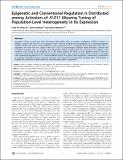Epigenetic and Conventional Regulation Is Distributed among Activators of FLO11 Allowing Tuning of Population-Level Heterogeneity in Its Expression
Author(s)
Octavio, Leah M.; Gedeon, Kamil S.; Maheshri, Narendra
DownloadOctavio-2009-Epigenetic and conve.pdf (701.7Kb)
PUBLISHER_CC
Publisher with Creative Commons License
Creative Commons Attribution
Terms of use
Metadata
Show full item recordAbstract
Epigenetic switches encode their state information either locally, often via covalent modification of DNA or histones, or globally, usually in the level of a trans-regulatory factor. Here we examine how the regulation of cis-encoded epigenetic switches controls the extent of heterogeneity in gene expression, which is ultimately tied to phenotypic diversity in a population. We show that two copies of the FLO11 locus in Saccharomyces cerevisiae switch between a silenced and competent promoter state in a random and independent fashion, implying that the molecular event leading to the transition occurs locally at the promoter, in cis. We further quantify the effect of trans regulators both on the slow epigenetic transitions between a silenced and competent promoter state and on the fast promoter transitions associated with conventional regulation of FLO11. We find different classes of regulators affect epigenetic, conventional, or both forms of regulation. Distributing kinetic control of epigenetic silencing and conventional gene activation offers cells flexibility in shaping the distribution of gene expression and phenotype within a population.
Date issued
2009-10Department
Massachusetts Institute of Technology. Computational and Systems Biology Program; Massachusetts Institute of Technology. Department of Chemical EngineeringJournal
PLoS Genetics
Publisher
Public Library of Science
Citation
Octavio, Leah M. , Kamil Gedeon, and Narendra Maheshri. “Epigenetic and Conventional Regulation Is Distributed among Activators of FLO11 Allowing Tuning of Population-Level Heterogeneity in Its Expression.” PLoS Genet 5.10 (2009): e1000673.
Version: Final published version
ISSN
1553-7390
1553-7404